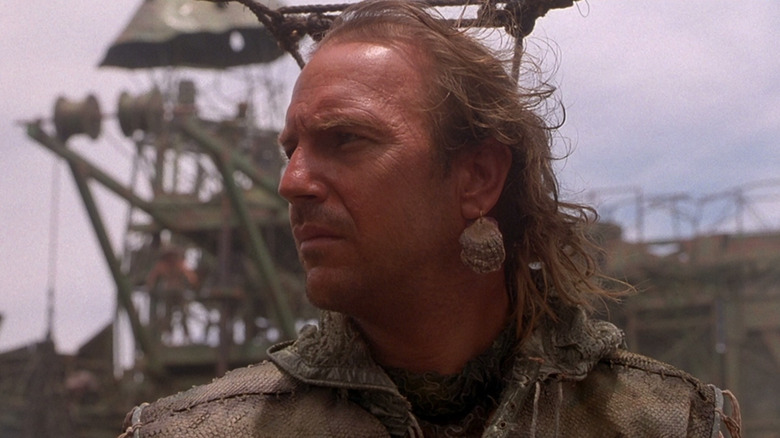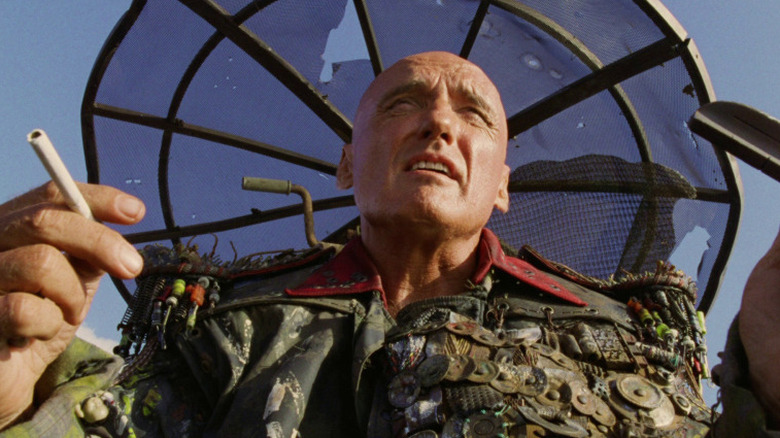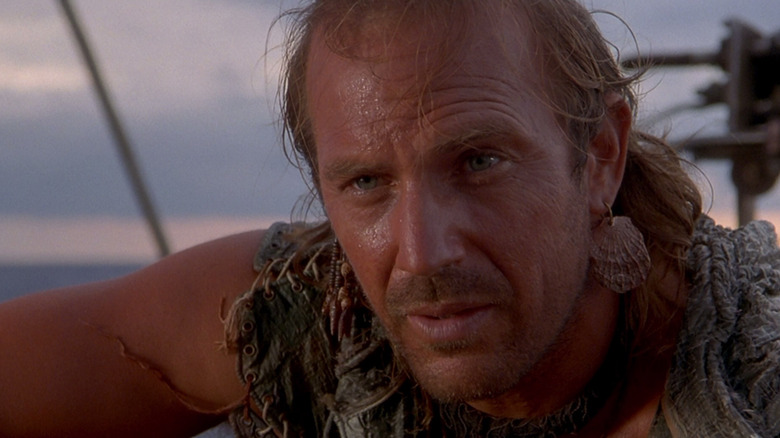Kevin Costner's Most Infamous Box Office 'Flop' Wasn't The Disaster People Think It Is
Kevin Costner's career has seen some dizzying peaks and astonishingly low valleys, but we've never seen the legendary movie star and multiple Oscar winner as down and just about out as he is right now. A newly-published The Hollywood Reporter expose has shone a light on not just Costner's surly behavior on the "Yellowstone" set, but also his humiliating failure to secure financing to finish his proposed four-part Western epic "Horizon: An American Saga" (the first entry tanked at the box office, which has left the finished second film without a distributor) and his alleged violation of on-set safety protocols when he forced a stuntwoman to perform an unscripted rape scene. It seems Costner's reputation for being difficult has caught up with him now that he's no longer a bankable movie star and is persona non grata in the wildly popular "Yellowstone" universe (which revived his career in the 2010s). THR's article paints a grim picture, but it gets unduly harsh and downright ahistorical when its author cites "Waterworld" as the flop that kicked off Costner's fall from commercial grace.
Here's the problem with this assertion: "Waterworld" wasn't a flop.
According to THR's story, when "Waterworld" hit theaters on July 28, 1995, it soon "became one of the biggest flops since ... well, 'Heaven's Gate.'" The reference to Michael Cimino's catastrophic Western flop is a callback to the reporting on Costner's directing debut, "Dances with Wolves" — which, with its daunting three-hour run time and association with what was then considered a dead genre, was vilified pre-release as "Kevin's Gate." Much crow was consumed when the movie became a hit and Costner won the Academy Awards for Best Picture and Best Director. Then, five years later, the hugely over-budget "Waterworld" was derided as "Fishtar." It was anything but.
Waterworld was certainly a troubled production
As a wholly original post-apocalyptic sci-fi flick, "Waterworld" was a huge commercial risk for Universal Pictures. Though Costner had just stumbled as the lead of Lawrence Kasdan's costly Western biopic "Wyatt Earp," he could survive a speed bump after his 1987-1993 run of hits. Factor in that he was re-teaming with "Robin Hood: Prince of Thieves" director Kevin Reynolds, and the studio couldn't say no — even if the budget was a dauntingly high $100 million.
Prior to principal photography, Steven Spielberg urged Costner and Reynolds to not shoot the movie on open water in the Pacific Ocean. The "Jaws" director knew well the budget-bloating potential of counting on Mother Nature's hospitality, but the filmmaking duo were dead set on making a one-of-a-kind oceanic epic and plowed forward (shooting in an artificial seawater enclosure off the coast of Hawaii). Thus began the nightmarish production of "Waterworld," with camera crews being frequently pushed out of position by waves, lousy weather extending the shoot 50-plus days over schedule, and a slavery colony set partially sinking. After all of this, the film's final budget was estimated to be somewhere in the neighborhood of $175 million, meaning that it would have to gross around $350 worldwide to sniff profitability.
"Waterworld" received largely mixed reviews from the nation's major critics. Only Chicago Reader's Jonathan Rosenbaum came closest to panning the movie, but Newsweek's David Ansen knocked out a rave. The film opened to a healthy, if unspectacular $21 million domestically and wound up grossing $264 million globally. The movie was clearly in the red, but this was far from a "Heaven's Gate"-scale disaster, where a $44 million film grossed a paltry $3.5 million. Other movies released in between Cimino's film and "Waterworld" (e.g. Terry Gilliam's "The Adventures of Baron Munchausen," which grossed $8 million against a $47 million budget) were much bigger money losers.
And once "Waterworld" hit the home entertainment revenue window, it might've actually turned a profit.
How Waterworld might've eked its way into the black
According to a profit comparison published by Deadline in 2013, "Waterworld" was nowhere close to a flop. Though the analyst's numbers are outdated in the streaming age, there was a time when "Waterworld" would've been a well-managed risk. All told, you could call it a disappointment relative to its sky-high cost, but it doesn't belong in a conversation with jaw-dropping bombs like "The Adventures of Pluto Nash," "Cutthroat Island," and "Inchon."
As for the alleged damage done to Costner's career, he bounced back with Ron Shelton's well-reviewed golf rom-com "Tin Cup" the following year (which, much like "Waterworld," became a dad movie favorite years after its theatrical release), before truly hitting the box office ditch with the critically panned flop "The Postman" in 1997. Still, Costner got back on track in 1999 with the popular romantic drama "Message in a Bottle," and, after a string of under-performers (like "Thirteen Days"), once again connected with moviegoers with the modest hit Western "Open Range" in 2003. Then the waters got choppy.
Costner has not starred in a box office success in 22 years, and, despite begging billionaires and Saudi Arabia for money, is nowhere close to completing the last two "Horizon: An American Saga" films. He's up against it now, and it sounds like he's brought much of this woe upon himself. But when you write about Costner's tumultuous career, you are doing cinema history a disservice when you call "Waterworld" a flop.


